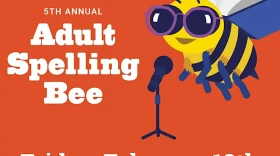Mother’s Day is just a few days off. Many of us will take the day to consider the lessons our moms imparted on us, or are still imparting. Lake Effect essayist Cari Carlson is certainly in that group.
Like most people over 60, I grew up with daily, sometimes hourly, nuggets of wisdom from my mom. I pretended to listen then dismissed her words as I carried on in my kid-centered orbit. Really, how many 10-year-olds listen to their mothers when they say, "Don't cross that bridge until you come to it." Later, I realized mom knew what she was talking about.
When my youngest brother was two, he had a severe case of measles-induced encephalitis. Guy went to bed one night, just like every other mischievous two-year-old, and woke up with garbled speech and a damaged brain that brought his physical and intellectual development to a stand-still.
After his brain was irrevocably damaged, my parents' lives took a sad, unexpected turn. That's when mom and dad learned to cross their bridges one at a time. Guy's life from that morning on presented non-stop challenges, including my parents places him in a psychiatric hospital when he was eighteen, where he was miserable. After he returned to a brief residence in a group home, they found him an apartment.
Mom crossed many bridges in the quest to find my brother his angle of repose. She kept her head up, didn't look too far out because the future was scary and crossed those bridges one at a time. I call that survival.
For me, I try to live in the moment, face each bridge as it comes and try not to concern myself about the unknown future of which I have little or no control. There will be many difficult crossings. It's all in the timing.
Those words of wisdom, the ones I ignored, came from generations of hard-working farm people, my maternal ancestors. They lived by those rules. There were no therapists to help them with adversity. So when mom said, "There's no problem that doesn't have a solution; you might not like it, but it's theres," she might have meant Guy.
In my teen years I had a different take on the problem-solution issue. My problems revolved around boys, parties, and looking good. Mom's problem was how to afford college for me. Her solution was a long string of crummy jobs so I could help pay my tuition at the University of Wisconsin. She made that clear to me at age fifteen. If I hated my summer jobs working at resorts in northern Michigan while my friends ran free, so be it. If I wanted to go to college I had to work.
She was the queen of frugal. I heard far too often, especially as a teenager, "If you don't need it, don't buy it." Try telling that to a sixteen-year-old whose friends have cashmere sweaters, while she is forced to dress in cheap orlon.
When I complained she brought out, "If wishes were horses, beggars would ride," when all I wanted was one, long-sleeved, pink cashmere sweater, so I didn't feel trashed among my high school crowd. She could've denied me the expensive sweater because she believed, "Handsome is as handsome does," her way of suggesting, "Let us not become too vain about our appearance."
But no matter how hard I tried to care for those ugly sweaters, they were always covered with little, pill-sized balls of fuzz that shouted: cheap. Vain I wasn't. I just wanted to fit in.
Mom's words speak to me often. When a seemingly impossible situation comes up, I think, "There's more than one way to skin a cat," and search for options yet to be discovered. When something trivial upset me, "Don't make a mountain out of a molehill," comes to mind, as does, "Don't cry over spilled milk."
Now I'm grateful for all the wisdom poured into my unresponsive head, gifts from my parents and especially mom, who articulated them while dad listened and nodded. They burrowed deep into my soul. When I raised my family, I turned into my mother. I smile when I hear my four children repeat the same advice to their children, echoing the wisdom of the woman who raised me.
Years ago I hung a wooden plaque in my bedroom that mom, dad, and I created with a wood-burning set, a gift for my tenth birthday. Their combined wisdom encapsulated in three short sentences. No platitudes, no cliches, just plain, simple language.
Here's what we burned into that wood: I resolve to mind my manners, to save my money, to keep my room clean.
That said, I would add: don't cross any bridges until you come to them.
As for those sweaters, I don't wear pink. But black cashmere looks really good with faded jeans. Mom is gone now, but I'm sure she would approve.






